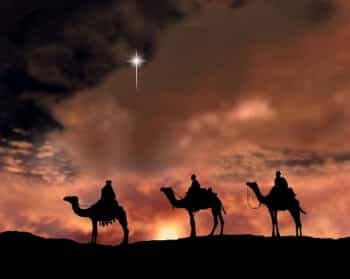
As we begin a new year, each of us begins a 365-day pilgrimage. Everyone has a different destination in mind. For some it may be a pilgrimage to more satisfying recreation, which might involve making a pilgrimage from the kitchen table to the TV set, hoping that by flipping channels will meet our expectations. For others it may be a pilgrimage to better health, and involve making a trip to the fitness center. Still others may seek to make more money this year, and their pilgrimage involves getting a new job or hiring a financial advisor. Our pilgrimages are determined by what we think will make us happier than we were last year.
Today we meet up will several amazing pilgrims. Their pilgrimage went far beyond a trip to the TV or to a local fitness center. They were “wise men” who sought what was most important in life. Their pilgrimage involved packing up, leaving everything behind, and mounting camels to take them down a dangerous route to a foreign land. They had a clear destination and were willing to do whatever it took to get there.
This is the feast of the Epiphany and celebrates the moment that Jesus was officially presented to the Gentile world (Matthew 2:1-12).
“…behold, magi from the east arrived in Jerusalem, saying, ‘Where is the newborn king of the Jews? We saw his star at its rising and have come to do him homage. When Herod heard this, he was greatly troubled and all Jerusalem with him.”
These wise men believed that God spoke to them daily in the sky. They caught sight of a new star “at its rising” and knew God was telling them something. They discerned that the long-promised king of Israel was born. Knowing that the Jews were God’s chosen people, they knew that the most important thing they could do was to make contact with this new infant king. And so they set out for Jerusalem.
Strangely, Herod and the people of Jerusalem were greatly troubled. How is it that these foreigners knew more about their king than they did? Jesus was born just down the road from them, but they did not know about him or bother to seek him. What “pilgrimages” were they on?
Herod called a meeting of the chief priests and scribes and found out that the Christ was to be born in Bethlehem. Pretending to be authentically interested in giving homage to the new king, Herod persuaded the magi to tip him off as to the precise whereabouts of the new king and report back to him.
“Go and search diligently for the child. When you have found him, bring me word…”
Herod, the least likely evangelist, gave the magi good advice. Too bad Herod didn’t follow it himself.
“After their audience with the king they set out. And behold, the star that they had seen at its rising preceded them, until it came and stopped over the place where the child was. They were overjoyed…they opened their treasures…they departed for their own country by another way.”
For those who sincerely seek Jesus with the kind of fervor displayed by the magi, God will give them a star to follow—a sign that others do not recognize. Surely others saw the star that night but didn’t identify it as directions from God. Herod, who sought Jesus for the wrong reason, could not see the star, nor follow it.
When the magi found Jesus, they were overwhelmed with joy that the end of their pilgrimage had been reached. Then they took valuable treasures fitting only for a king and handed them over to Jesus.
Today we set out on a new pilgrimage. We pray for the kind of resolve demonstrated by the magi and follow the advice of Herod to “go and search diligently” for Jesus. As we examine our “destinations” for 2025, is finding Jesus in a deeper way at the top of the list? What treasure will we give up when we find him?
